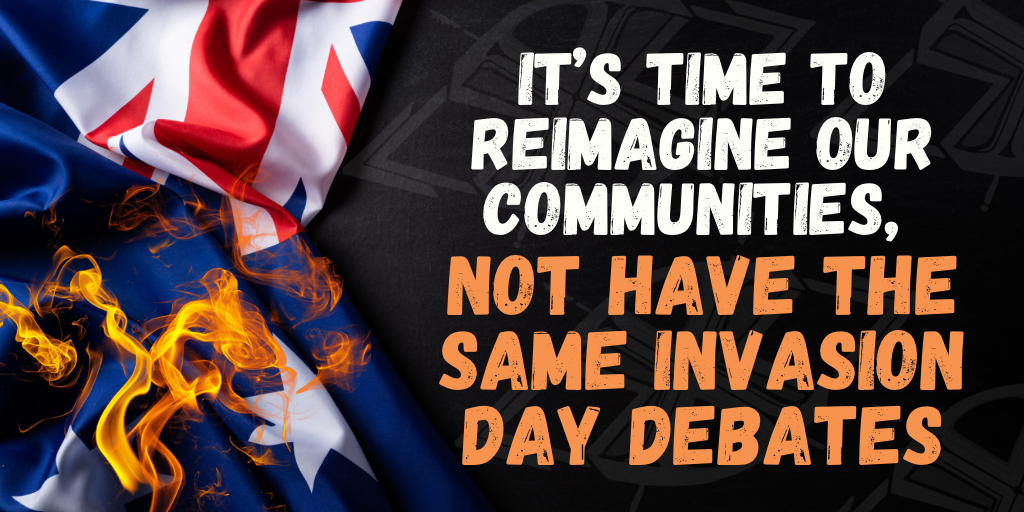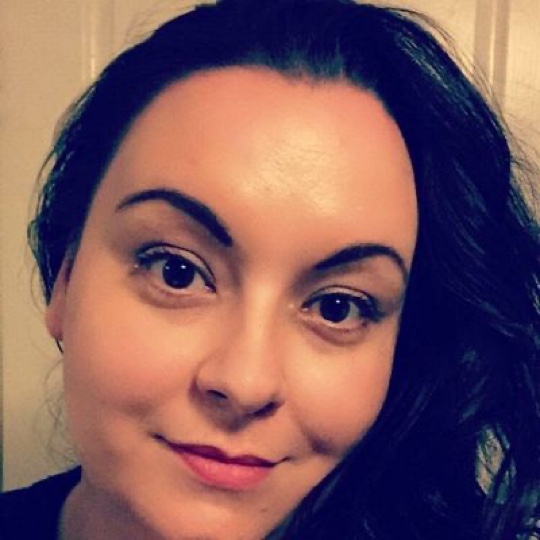It’s time to reimagine our communities, not have the same Invasion Day debates

This time of year can be triggering for mob. In 2024, after a lost referendum has resulted in a rise of racist calls against all things Indigenous, it seems to have reached new heights and the pain is palpable.
Those of us feeling this pain, feel compelled to help and support each other and drain our own tanks because that is what so many mob do. This year, I feel like all mob are finding reserves they didn’t know they had or have no choice to find, because the tank is empty, but the work continues.
This year – while we continue to press ahead in doing the work, I call upon allies to not trot out tired back and forth arguments pertaining to January 26 and don’t get caught up in #changethedate. We do not need any more symbolic changes – we need radical change. We all know what this day represents, and why so many cling to the celebration of it. I ask you to ignore the noise coming from the people who are determined to maintain their right to participate in racist celebrations.
Instead, let’s think about how we need to maintain focus. It is imperative that we do.
I have never really been good at articulating my emotions. Words are something I’ve needed to craft my career, but even so, I find the articulation of emotions and their weight to be something I struggle with. How can words possibly give voice to the inner turmoil we are in?
I could tell you, watching an ongoing genocide for more than 90 days is shredding my soul; I could tell you despite all of the behind the scenes agitating and protesting, the powerlessness is clawing; I could tell you the fractures from within my own communities feel like mighty canyons following the referendum of 2023; and I could tell you despite my own deep personal grief happening in parallel – nothing I feel can be compared to the terror of our brothers and sisters on the other side of the world. Every day we lay our heads down, we feel pain and guilt because of what they are feeling and our nation’s ‘leaders’ continue to fail to uphold international law, let alone compel others to uphold it.
We cannot be free until all are free; we will feel no emancipation from colonisation until the structures of colonisation are dismantled in a reckoning that has been a long time coming. This applies to the treatment of Indigenous people here and on other continents – we (society at large) cannot be free, until all are free.
Contrary to what fearmongering potatoes will have you thinking, this reckoning is not of the colonial violence kind (although it makes sense as to why reprisal is the only counter to hundreds of years of violence that you can think of). Instead we are doing the work in reimagining and reviving our ways in our communities in spite of the violence all around us. It is in reimagining our communities to be as they should be – caring, nurturing, healthy, happy and with enough.
Enough means very different things to different people. Enough to people raised and creating their own communities of people-centred care and wellbeing dynamics consider enough to be that people have a bed, they have food, access to good health care and the ability to live how they choose to live.
Enough to the power structures that force feed ideals of capitalism through media and policies is the individual pursuit of wealth and having comfortable excess. This disparate outcome and approach to thinking is what gives us such unwell communities. Where we are in mental health crises, where homelessness is out of control, where artifice and the pursuit of it leads to competitiveness and ugliness in human behaviours. All of this, a result of capitalism introduced by colonial forces.
Colonisation is wedded to capitalism and the necessity to have limited numbers of people at the upper echelons of colonial society and plenty of people struggling to have enough, struggling to survive as their labour is essential for the maintenance of the status quo. This colonial model continues here in this colony and we are seeing colonisation violently reinforced in Gaza.
As Dr Chelsea Watego articulates far better than I can, Australia has not reached its post-colonial moment despite the history books trying to suggest we have. We are not a benevolent and peaceful society, this country continues to visit violence on brown bodies, continues to maintain systems of oppression that disproportionately affect Blak women, and it continues to lack the imagination to truly shed the shackles of Commonwealth short sightedness.
This system fails to generate a well society, societal perspectives and priorities are out of whack, and it is not enough to Indigenise the systems in place – we need them to be completely dismantled and new systems and structures that centre peoples and communities need to take their place. Put simply, racism needs to be actively worked against by all people within our society – so we can force the structural change we need to reimagine our communities.
Dr Amy McQuire expresses this in much of her writing, particularly with the ongoing crisis of violence against women. Dr McQuire states simply examining an issue is not enough, you need to centre the right voices to ensure that any addressing of the ‘issue’ is not based upon reinforced colonial ideals of entrenching further violence into communities. Instead, she urges us to consider all of the issues, all impacts and the intersections of those impacts, and it is this work, this re-centring that will ensure outcomes have the most impact rather than more Band-Aids applied by an inherently violent system.
I urge non-Indigenous allies to really contemplate your place here and how your own future is so indelibly tied to ours. I urge you to contemplate the lies we are told and often tell ourselves when we consider this colony and our place in it.
It is not a country of ‘fair go’, it is not a country where if you work hard – the returns follow, it is not a country where anyone is safe, and it is not a multicultural country.
The fallacy of Australia being multicultural is dispelled immediately upon a short scroll of the media, social media comment sections and in interactions in communities. This country is not multicultural, this country seeks the labour, ideas, palatable parts of culture (food) but ultimately, wants to maintain its initial goal of assimilation. This country repurposes and repackages the ideals and pursuits of the colonisers and uses them against all in our communities. This is why the reimagined community is so essential – because it needs to centre the most oppressed members of our society to ensure all are treated fairly and equally – in outcomes.
This January 26 and every other day, find ways to lighten the load of Indigenous people who are on the frontlines doing the work, with some being re-traumatised daily. Find ways to collectivise and tangibly support our work – this could be through providing transportation to events and protests, funerals and medical appointments; shouting a cuppa; shouting a feed; supporting the community call outs for assistance.
Our society can only be judged by how it treats its most vulnerable. The power structures running our society have failed us, community reimagining and community centred care and wellbeing is a necessary future we need to continue to work towards, and engage with everyday herein till we get there.




